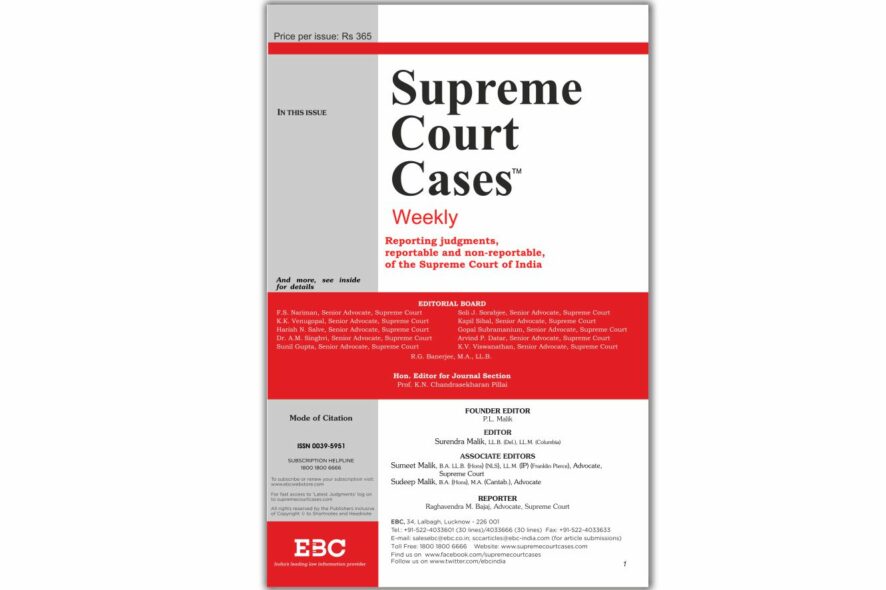In Part 1 Volume 10 of 2021, read Supreme Court’s decision in Supertech Ltd. v. Emerald Court Owner Resident Welfare Assn., (2021) 10 SCC 1, wherein the Court made an observation that “illegal constructions have to be dealt with strictly to ensure compliance with the rule of law.”
Short Notes: 14
Read more such Judgments carefully and expertly analysed by our editors.
Energy, Power and Electricity — Electricity — Generation and Transmission/Supply/Distribution of electricity — Multipurpose/Hydroelectricity Projects: Private entity or agency would stand to gain from and out of capital outlay and infrastructure put in place by State. Hence, some reasonable charges for such benefit cannot be said to be invalid. Nor was the clause to this effect in agreements entered into between the private entities and Government unconscionable as the private entities concerned were not in a position of lesser bargaining power and the agreements were entered into after long deliberations involving legal counsel. [Indsil Hydro Power & Manganese Ltd. v. State of Kerala, (2021) 10 SCC 165]
Income Tax Act, 1961 — S. 14-A — Disallowance on expenditure incurred for earning tax-free income in cases where assessees do not maintain separate accounts for the investments and other expenditures incurred for earning the tax-free income: The proportionate disallowance of interest is not warranted under S. 14-A for investments made in taxfree bonds/securities which yield tax-free dividend and interest to assessee Banks in those situations where, interest-free own funds available with the assessee, exceeded their investments. [South Indian Bank Ltd. v. CIT, (2021) 10 SCC 153]
Local Government, Municipalities and Panchayats — Town Planning — Building plans/Rules/Regulations/Bye-Laws/Building permission — Construction in violation of building regulations: A breach by development/planning authority of its obligation to ensure compliance with building regulations is actionable at instance of residents whose rights are infringed by violation of law. Their quality of life is directly affected by failure of planning authority to enforce compliance. Hence, law must step in to protect their legitimate concerns. Thus, when planning and building regulations are violated by developers, more often than not with the connivance of regulatory authorities, it strikes at the very core of urban planning, thereby directly resulting in an increased harm to the environment and a dilution of safety standards. Hence, illegal constructions have to be dealt with strictly to ensure compliance with the rule of law. [Supertech Ltd. v. Emerald Court Owner Resident Welfare Assn., (2021) 10 SCC 1]
Narcotic Drugs and Psychotropic Substances Act, 1985 — Ss. 37, 8, 19 to 22, 24, 27-A, 29, 60(3), 67, 42 and 50 — Grant of bail for offences under NDPS Act — Tests which High Court and Supreme Court are required to apply while granting bail: A finding of the absence of possession of the contraband on the person of the accused does not absolve it of the level of scrutiny required under S. 37(1)(b)(ii). Furthermore, held, mere absence of possession of the contraband on the person of the accused does not ipso facto mean that the accused was not in “conscious possession” of the contraband. Rather, the knowledge of possession of contraband has to be gleaned from the facts and circumstances of a case. The standard of conscious possession would be different in case of a public transport vehicle with several persons as opposed to a private vehicle with a few persons known to one another, the latter being the situation in the present case. The term “possession” could mean physical possession with animus; custody over the prohibited substances with animus; exercise of dominion and control as a result of concealment; or personal knowledge as to the existence of the contraband and the intention based on such knowledge. [Union of India v. Mohd. Nawaz Khan, (2021) 10 SCC 100]
Service Law — Appointment — Nature of appointment — Determination of — Substantive appointment or contractual appointment — Substantive appointment — What is: Appointments made in accordance with procedure prescribed under applicable Act and Rules, held, are ordinarily substantive in nature and cannot be converted to contractual appointments by arbitrarily inserting term(s) in appointment letter which are not in conformity with statutory requirements and prescribed procedure, and when there is no mention that appointments would be contractual in nature, anywhere at all prior thereto in the entire selection process, right from issuance of advertisements up until the last stage when statutorily constituted Selection Committee had approved the recommendations for appointment. Furthermore, fact that candidates concerned had accepted terms and conditions contained in appointment letter is inconsequential, since it is not open for person appointed in public employment to ordinarily choose terms and conditions of his service as employer is in dominating position and can always dictate terms. Judicial notice taken of fact that incumbent may lose job opportunity if he questions terms and conditions of his employment. Hence, held, it is open to employee to challenge such terms which are not in conformity with statutory requirements and prescribed procedure and he is not estopped from questioning at stage where he finds himself aggrieved. [Somesh Thapliyal v. HNB Garhwal University, (2021) 10 SCC 116]






